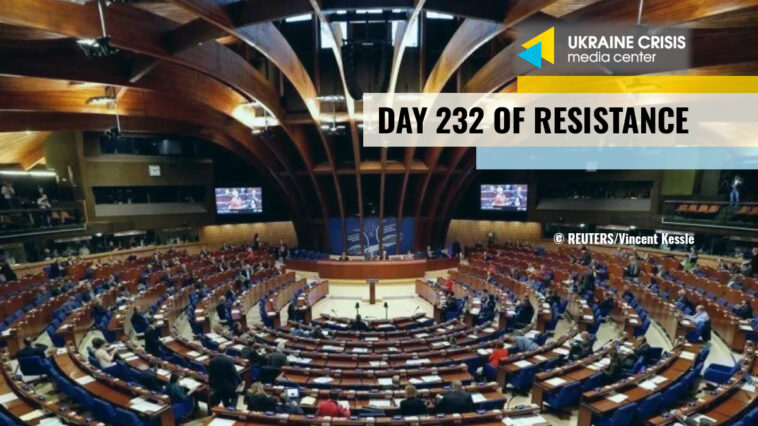PACE passes resolution to label Russia terrorist regime
On Thursday, October 13, the Parliamentary Assembly of the Council of Europe passed a resolution in support of Ukraine, calling on the Council of Europe member states to declare Russia a terrorist regime.
The resolution passed by a vote of 99 to 0, with one abstention.
Oleksiy Honcharenko, MP, member of the Ukrainian delegation to PACE highlighted key points. The resolution designates Russia as a terrorist regime and sends a powerful signal to the world calling to label Russia as a state sponsor of terrorism, Honcharenko said.
For the first time in history, the Council of Europe urged to give weapons to a country – air defenses to protect civilians in Ukraine. Russia’s nuclear threats are incompatible with its permanent seat at the UN Security Council. The resolution also calls to accelerate the setup of an ad hoc International Tribunal to prosecute the crime of aggression against Ukraine, the MP said.
Ukrainian President Volodymyr Zelenskyi said the PACE’s resolution sends a “strong signal to the global community”. Ukraine calls to designate Russia a terrorist state, responding to its annexations of more Ukrainian territory and the raging war.
Russian missiles hit military facility in Lviv region, rain down on Kharkiv
A Russian missile strike on Thursday, October 13, hit a military facility in Lviv region, head of the Lviv regional military administration Maksym Kozytskyi said. There were no fatalities.
The Russian forces launched six missiles at Lviv region, of which four were shot down by the Ukrainian air defense systems. There were two impacts. The facility was struck for the second time, Kozytskyi said. The strike damaged military assets, he added.
On the evening of October 13, Russia carried out missile strikes on Kharkiv and the region, damaging critical infrastructure and causing power outages. There were impacts in Kharkiv’s Kholodnohirskyi district. There were no casualties. The strikes also damaged critical infrastructure across the region, possibly causing short-term outages. Repair works are under way.
Russia may stage provocation at TurkStream, Ukraine’s Foreign Ministry says
On Thursday, the Ministry of Foreign Affairs of Ukraine called on Ukraine’s Western allies to reaffirm impossibility of having the sanctions on Russia lifted, and Nord Stream 2 relaunched in the wake of preventing Russia’s energy terrorism.
Russia threatened the European governments with energy blackmail, pressing them toward concessions, including lifting of the sanctions, Ukraine’s Foreign Ministry said. The threats were not successful.
“Putin decided to move from blackmail to terrorism by causing physical damage to the energy infrastructure. His goal is to disrupt supply routes and issue an ultimatum: launch Nord Stream 2 because you have no other choice. Public hints of such a scenario have already been heard from Russian officials,” the Ministry said.
Ukraine regularly informs foreign partners about Russia’s possible sabotage actions to destroy alternative ways of supplying energy. President Zelenskyi earlier warned that Russia is possibly preparing to inflict damage on Ukraine’s gas transportation infrastructure.
“Russia is possibly carrying similar plans for TurkStream,” Ukraine’s Ministry of Foreign Affairs stated.
War-related trauma in Ukraine: Part 2. Ukraine in Flames #217
After the morning of February 24, the whole Ukrainian society became united not only in fighting the Russian aggression in every possible way but also through collective trauma. We can see its first effects today: people can no longer make long-term plans fearing they may be destroyed by the Russian war. Both the military and civilians suffer from various psychological conditions. How does their experience differ, what exactly is collective trauma, and how long will it take for Ukraine to have a trauma-free society? This is the second part of Ukraine In Flames issue dedicated to exploring Ukrainian trauma.
Guests:
- Andriy Fomenko, crisis psychologist
- Oleh Pokalchuk, social psychologist
- Kira Weber, consultant in positive psychotherapy and coach who received qualification in Kyiv

